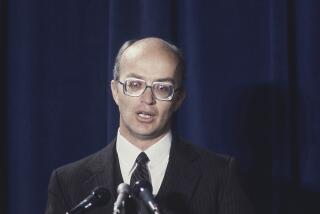George Will’s Diatribe Against Reagan
- Share via
Here’s a little medicine to lower the blood pressure of those who have been reading George Will’s rantings against the Administration’s handling of the cases of Nicholas Daniloff, Gennady Zakharov and Yuri Orlov.
In the first place, it is not crystal clear that Daniloff was a hostage--certainly not in the crude sense, as Will implies. The true, crude hostage-taker bluntly announces his purpose, which always implies that guilt or innocence of the hostage is irrelevant.
Daniloff was not overtly threatened with detention or punishment if Zakharov were not released. He was threatened with a trial. Even if one believes that the arrest amounted to subtle blackmail, there is a distinction.
If you can’t swallow the above, perhaps the following will go down easier. Diplomats engaged (or thought to be engaged) in spying are not tried, but simply sent home. Every argument that supports this procedure in the case of a diplomat supports the same procedure for government officials of slightly lower social status and for journalists. So, in a sensible world, Daniloff and Zakharov would have been treated separately and merely sent home as erring quasi-diplomats. The Administration accomplished the same result, and received Orlov as a bonus.
Will quotes Sen. Daniel Patrick Moynihan (D-N.Y.): “We began this chain of events 30 years ago when we started letting the Soviets fill up the U.N. Secretariat with spies, in direct violation of the (U.N.) Charter.” This, if true, makes President Reagan’s six predecessors look pretty careless. But why doesn’t Will give President Reagan credit for finally attacking the problem directly by action against the Soviet delegation?
Will supports an overall economic reprisal against the U.N. to punish the world for Soviet espionage. In this position alone he has made it clear that he is anything but qualified to speak of “the absence of intellectual ballast in the Administration.”
Incidentally, the official version that Zakharov was swapped for Orlov and that Daniloff’s release was unconditional and unconnected is logically impeccable. Some known extraneous pressure and probably some unknown was used to further Daniloff’s release, and may have been sufficient. In any case, the satisfactory results and the absence of blood on the floor are signs of good diplomacy.
JOHN H. RANDOLPH
Oxnard
More to Read
Get the L.A. Times Politics newsletter
Deeply reported insights into legislation, politics and policy from Sacramento, Washington and beyond. In your inbox twice per week.
You may occasionally receive promotional content from the Los Angeles Times.









